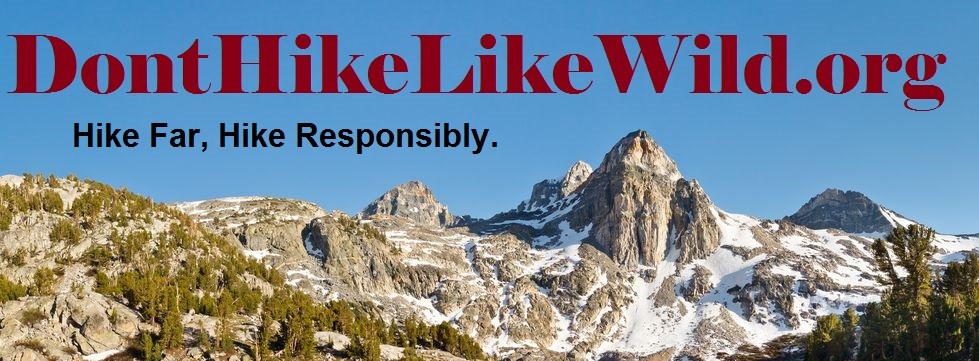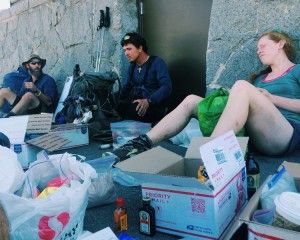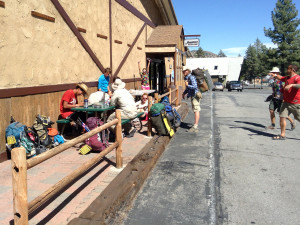When Cheryl Strayed made her long hike across California and Oregon over two decades ago, the Pacific Crest Trail was a different place then it is today. In the mid-1990’s the PCT saw maybe a few dozen thru-hikers each year. Last year there were nearly 4500 permits issued to walk the PCT. One result of the participation of that many hikers is that it tends to magnify the effects of their presence on the trail and in towns and communities along the way.
A majority of PCT thru-hikers embark on their journeys within a month-long window of optimal hiking conditions following seasonal requirements. This means that instead of trail usage being spread out over the summer, the main group of hikers is often bunched up in few hundred mile-long ‘bubble’. This concentration has resulted in greater impacts to hiker towns, campgrounds, restaurants and hostels along the way. While hikers do spend money in these places, they often create other unintended impacts that are not always appreciated by locals
Unfortunately, on the PCT and other long trails, some localities are becoming unreceptive to visiting hikers, hiker hostels are closing, and ‘No Hikers’ signs are popping up in establishments in towns along the trail. Baxter State Park is even considering moving the northern terminus of the Appalachian Trail away from Mt. Katahdin to reduce hiker impacts. The good news is that with a little effort and thoughtfulness, hikers can minimize the results of their increasing numbers. Hikers should be aware that their behavior can affect the reputation of hikers that are to come.
By now most outdoorsmen are familiar with the 7 Leave-No-Trace principles of living and camping in the backcountry. The time has come for the thru-hiking community to acknowledge our impact while off the trail in local communities and establishments as well. Thus we present 7 guidelines for establishing good relations with the local folks who serve our growing needs. So perhaps rather than ‘leave no trace’ while in town, it is better to think ‘leave a great impression’!
- Always tip at least 20%. Understand that you are often visiting tourist areas during high season and that workers are either slammed or exhausted from a long summer of serving often ungrateful guests. Or perhaps they were stiffed by a previous hiker. Be mindful of this if you ever receive mediocre service. By going above and beyond as guests, we can create a better reception for the next hiker.
- Never expect trail magic. Remember that trail angels and other friendly public are using their own time and resources to help make your day a little better. Don’t ever assume that your gratitude is understood. Make it known how much you appreciate these random acts of kindness. If there is a donation jar, keep it full. If you cannot afford to contribute to angels or hostel owners, consider not using their services.
- Be aware of special rules in parks and others jurisdictions. Take the time to read signs and follow posted rules. Be understanding if you are asked not to nap in the town park. Don’t try to sneak your dog through the National Park. Don’t pop that bottle of champagne on the top of Mt. Katahdin. You may not agree with every rule, but remember that we are guests, and as visitors we don’t have to live with an influx of users in our hometown every day.
- Respect local businesses. It is fantastic when local establishments open their doors to smelly hikers fresh off the trail. However very few businesses rely on hiker dollars for survival. Most cater to hikers out of altruism, not profit. Consider shopping local where appropriate, instead of relying on resupply packages at every stop.
- Avoid traveling or congregating in large groups. Part of the appeal of hiking a long distance trail is being part of the community that surrounds it. However a friendly group of hikers can soon become a horde in the eyes of the public. While sneaking a few extra jelly packets from the IHOP might seem small potatoes for just one hiker, these things tend to get noticed when multiplied by thousands.
- Be mindful of alcohol consumption. Be aware of the perception of us in the eyes of some as walking party animals, and limit your use of alcohol. Ditto with smoking weed in public.
- Don’t contribute to a sense of entitlement among hikers. You have probably hiked hundreds of miles for weeks on end. This in itself is a huge accomplishment, and you may be a hero in the eyes of the folks back home. But out here you’re just another grungy hiker. Always be gracious for any generosity or tolerance you may receive.
To be clear, it’s true that the vast majority of hikers are usually polite and conscientious about their behavior. However, a few bad apples can sour the reputation of our entire community. And even the most thoughtful hikers who arrive in town weary, in need of a shower, a hot meal and clean laundry might not always put the needs of the community first. Consequently, it is up to hikers to police themselves. If you see another hiker not behaving with the upmost respect, don’t be afraid to speak up and point out how we can leave behind a great impression to our hosts along the trail.


